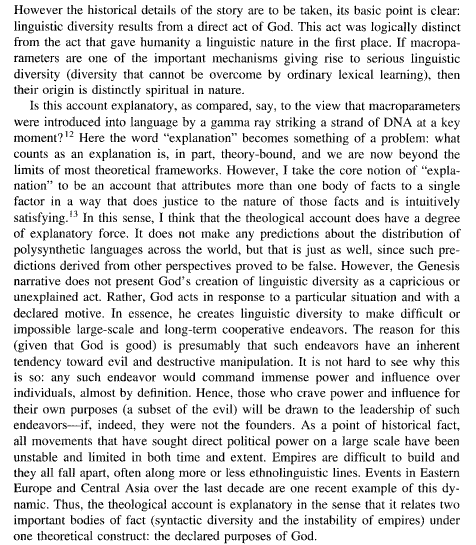January 01, 2008
More on the theology of linguistic diversity
Following up on several recent posts ("The science and theology of global language change", 12/30/2007; "Mailbag: the comparative theology of linguistic diversity", 12/31/2007; "The origin of speeches: wrathful dispersion for real?", 12/31/2007), Rob Malouf has written to point out that Mark Baker 's 1996 book, The Polysynthesis Parameter (Oxford University Press), ends with a serious discussion of.the "theology of linguistic diversity".
The body of this book is devoted the presentation of an interesting linguistic hypothesis, along with a great deal of supporting evidence. From the preface:
Among the most fascinating questions about language to both specialists and non-specialists is: How different are languages and what do those differences mean? This book represents an effort to come to grips with the first part of this question by looking in detail at a type of language that has had relatively little impact on the formulation and development of contemporary linguistic theory. These are the polysynthetic languages, informally defined as those languages in which verbs are built up of many parts, such that a single verb often performs the same expressive function as a whole sentence in more familiar languages. [...]
On a a descriptive level, the book presents many details facts about the syntax and syntax-related morphology of the Mohawk language, a paradigm example of polysynthesis. [...]
On the theoretical level, this book is concerned with discovering a conception of Universal Grammar that is valid for both polysynthetic languages and nonpolysynthetic languages. ... This book explares a strong and interesting position [...], namely, that the characteristic constructions of polysynthetic languages share a common property. [...] In other words, there is a single, well-defined "Polysynthesis parameter." Thus, while the system of syntactic principles in, say, Mohawk is virtually identical to that of, say, English, the syntactic structure of most sentences is quite different because of the need to conform to this special condition. [...]
The comparative level of this book emerges from its descriptive and theoretical concerns. If it is true that the various structures of Mohawk have the character they do because they must all satisfy a single general condition, then these structures or something like them should coexist in other polysynthetic languages as well. [...] To show that this is true, the structure of Mohawk is compared with that of six other languages historically and geographically distant from it; Wichita, Southern Tiwa, Nahuatl, Mayali (and other Gunwingjguan languages), Chukchee, and Ainu.
(Those who want more details of the argument should check out the book in their local library, or buy a copy; but more details of the argument can be seen in a 2002 chapter available on Mark's web site, "On zero agreement and Polysynthesis". If the MSWord format is problematic for you, a .pdf is here.).
The theological discussion is in the conclusion, starting on p. 512:
If biological and sociological categories are ill-equipped to explain the possiblity of syntactic diversity, are there any other candidates? Are there other forces at work that might play a role in shaping human language capacities?
In fact, many cultures and historical periods have believed that language is not just a biological phenomenon or a social institution; rather it also has an important spiritual component. ...
In the Judeo-Christian scriptures language is, then, a property of humankind by virtue of the fact that God creates humans "in his own image" (Gen. 1:27). All other animals are called forth out of the ground, implying that they have a physical nature and are subject to the same physical principles as inanimate matter 9Gen. 1:24). The creation of humanity, however, has a second step: 'The Lord God formed the man from the dust of the ground and breathed into his nostrils the breath of life, and the man became a living being" (Gen. 2:7). In other words, humanity is given a spiritual nature that is specifically said to be parallel in many respects to God's. Among other things, this means that since God is a linguistic being, so are humans.
[...]
Suppose that these traditions are either more insightful or have better memories, or both, than the dominant modern academic tradition in this respect. Then one might expect spiritual forces to give some insight into the particular shape of language. Thus, we can ask whether there is a theological explanation of syntactic diversity.
Strikingly, the problem of syntactic diversity is the one aspect of language for which the Judeo-Christian scriptures provide an explanation. The origins of language itself are only revealed indirectly, as a corollary of creation in the divine nature. Linguistic diversity, however, merits a story of its own -- the account of the Tower of Babel (Gen . 11:1, 5-9).
Here's Mark's account of God's purpose, in a screen capture from Google books:

And his concluding theodicy:
The theological approach also fits well with the fact ... that linguistic diversity seems to decrease rather than increase human chances for survival. From the evolutionary standpoint, this is a potential embarrassment. However, Genesis presents the creation of linguistic diversity as an act of judgment and limitation, meant to afflict humanity and prevent it from reaching certain goals, rather than as an act of blessing. And so we often find it to be.
This is a serious argument, and one that could form the theme of a moving sermon.
But with respect, I think that Mark's evaluation of the evolutionary perspective is simplistic. The genetic propensity for linguistic innovation would still prosper in darwinian terms, even if it sometimes causes group slaughter, as long as it usually favors the differential reproduction of individuals. And it's easy to tell stories with this moral, starting with sexual selection for innovative virtuosity in pre-linguistic vocal display. The same sort of darwinian engine that drives shared innovation in the songs of humpbacked whales could well have driven shared innovation in human linguistic history.
Posted by Mark Liberman at January 1, 2008 08:47 PM